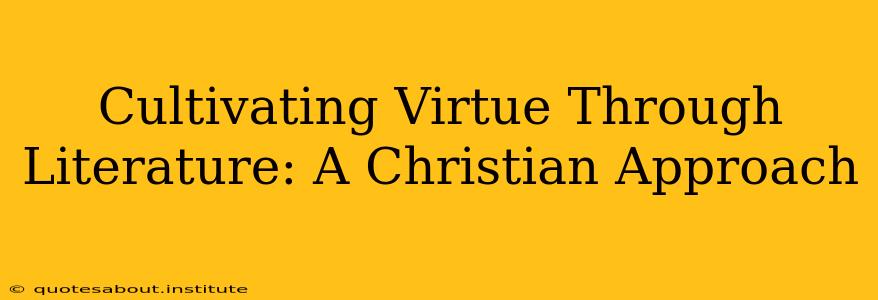For centuries, literature has served as a powerful tool for shaping character and fostering moral development. Within the Christian faith, engaging with literature offers a unique opportunity to cultivate virtue, explore theological concepts, and deepen one's spiritual understanding. This approach isn't about simply avoiding "bad" books; it's about actively seeking out narratives that illuminate the path towards Christian virtue and inspire personal growth. This post will explore how Christians can leverage literature to cultivate virtue, addressing common questions along the way.
How Can Reading Help Me Grow Spiritually?
Reading, especially thoughtful engagement with well-written stories, allows us to vicariously experience a wide range of emotions, perspectives, and moral dilemmas. By stepping into the shoes of fictional characters, we can grapple with complex ethical issues, learn from their successes and failures, and ultimately develop our own moral compass. This process of empathetic engagement strengthens our ability to discern right from wrong and makes us more attuned to the needs of others, a key element of Christian virtue. Christian literature, in particular, often explicitly explores theological themes and models virtuous behavior through its characters, providing a framework for understanding and applying faith to everyday life.
What Kinds of Books Should Christians Read?
The beauty of this approach lies in its diversity. There's no single "Christian" reading list. Instead, consider exploring works that:
-
Model Christian virtues: Look for books that showcase characters exhibiting faith, hope, love, compassion, forgiveness, humility, and perseverance. These virtues, central to Christian teachings, are often explored powerfully in literature, offering real-world examples and inspiring emulation. Classic works like Pilgrim's Progress by John Bunyan explicitly teach Christian principles through allegory.
-
Explore moral dilemmas: Stories that present complex ethical challenges force us to confront our own values and consider different perspectives. This active engagement sharpens our moral judgment and strengthens our ability to navigate difficult situations in our lives.
-
Offer insightful perspectives on faith: Many books, even those not explicitly religious, delve into themes of suffering, redemption, grace, and the search for meaning – themes central to the Christian faith. Examining how these themes are explored in different contexts broadens our understanding and deepens our faith.
-
Inspire reflection and prayer: A thoughtful reader will engage with the text on multiple levels, allowing the narrative to prompt self-reflection and prayerful contemplation. This active engagement transforms reading from passive consumption into a spiritual practice.
What are Some Examples of Books that Promote Christian Virtues?
Choosing books is a personal journey. However, some examples of authors and works frequently cited for their exploration of Christian themes and virtues include:
- C.S. Lewis: The Chronicles of Narnia, Mere Christianity, The Screwtape Letters
- G.K. Chesterton: The Everlasting Man, Orthodoxy
- Flannery O'Connor: Wise Blood, A Good Man Is Hard to Find (While exploring darker aspects of humanity, her works often illuminate grace and redemption.)
- Madeleine L'Engle: A Wrinkle in Time, Many Waters
Are There Any Books Christians Should Avoid?
While there's no need for censorship, discerning readers will approach certain material with caution. Content that consistently glorifies violence, sexual immorality, or promotes harmful ideologies should be approached critically and perhaps avoided altogether. The goal is not to shun all challenging material, but to engage with literature that aligns with Christian values and supports personal spiritual growth.
How Can I Make the Most of My Reading for Spiritual Growth?
-
Engage actively: Don't just passively read. Take notes, reflect on the characters' motivations, and consider how the story relates to your own life and faith.
-
Pray before and after reading: Ask God to guide your understanding and to apply the lessons you learn to your life.
-
Discuss your reading with others: Sharing your thoughts and insights with a trusted friend, mentor, or small group can deepen your understanding and provide valuable perspective.
-
Choose wisely: Select books based on your current stage of faith and the virtues you hope to cultivate.
Cultivating virtue through literature is a journey, not a destination. By carefully selecting and thoughtfully engaging with books that reflect Christian values, you can enrich your spiritual life, deepen your understanding of faith, and grow in your journey towards Christ-like character. Remember to approach your reading with prayerful intention, seeking guidance from the Holy Spirit to discern the wisdom and lessons each book offers.

